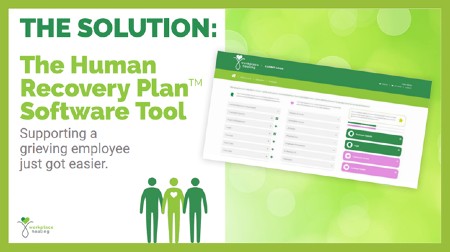
Seasons of Grief: The Not So Sunny Side of Spring
Seasons of Grief: Spring and its multitude of holidays can be a challenging time for grieving employees. Many of us welcome the onset of the spring season bursting with rebirth, renewal, and celebrations. But it can also be a stormy and unpredictable season, just like grief. For a person who is grappling with the loss of a loved one, this time of the year can be fraught with difficult and sometimes perplexing emotions. As a manager, it’s helpful to know what to expect and how to support a grieving employee during this time of the year.
Why is spring hard on grieving employees?
Many of us think of the winter holidays as an especially difficult time for grievers, but grief doesn’t slip into the shadows with the onset of warmer temperatures and the sweet scents of floral blooms wafting through the air. In fact, the opposite tends to be true. The spring and summer holidays can be particularly grueling for an employee who is grieving for a variety of reasons.
- Spring might be a season their loved one particularly embraced.
- It may mark the anniversary of their loved one’s death, a birthday, or a wedding anniversary.
- This could be the first season or holiday they are facing after the loss of a parent, spouse, child, sibling, or another loved one.
- It might not be one specific event, but a mixture of emotions and memories swirling together.
Seasons of grief and the holidays
 For many people, the loss of a family member can feel especially acute and isolating during times of the year when everyone around them is gathering with loved ones and their social media feeds are bursting with proclamations of love, good cheer, and photos of smiling families celebrating.
For many people, the loss of a family member can feel especially acute and isolating during times of the year when everyone around them is gathering with loved ones and their social media feeds are bursting with proclamations of love, good cheer, and photos of smiling families celebrating.
Beginning in spring, holidays like Easter, Passover, and Ramadan traditionally bring families together. In sharp contrast to these joyful gatherings, sits Dad’s empty chair at the table, the missing special holiday dish only Mom knew how to make, or the absence of a sibling’s laughter. And for some, it can mean spending their holiday alone for the first time without their partner.
On the heels of these holidays, come Mother’s Day and Memorial Day in May and Father’s Day in June. Not to mention, wedding celebrations, graduations, wedding anniversaries, and birthdays that tend to blossom across every square inch of the calendar like wildflowers.
Even if a loss happened years ago, spring can trigger feelings of anxiety, stress, anger, and sadness. A 2014 study found that widows experience greater psychological distress following a late spouse’s birthday, immediately after the winter holidays in January, and in June, a popular month for anniversaries and graduations.
Springtime can also be exceptionally difficult for those who have lost loved ones to suicide. Researchers have found an alarming trend indicating that suicide rates tend to peak during the months of April through June.
Help a grieving employee cope during the holidays
 Unsupported grief can affect job performance and result in higher degrees of stress and burnout, which can translate into increased absenteeism and presenteeism (which is when an employee is physically present but emotionally disengaged). The costs to morale and productivity can be enormous, with employers spending billions as a result of reduced productivity, turnover, and on-the-job errors (2018 Grief Recovery Institute).
Unsupported grief can affect job performance and result in higher degrees of stress and burnout, which can translate into increased absenteeism and presenteeism (which is when an employee is physically present but emotionally disengaged). The costs to morale and productivity can be enormous, with employers spending billions as a result of reduced productivity, turnover, and on-the-job errors (2018 Grief Recovery Institute).
If you have built a Human Recovery Plan for your grieving employee through Workplace Healing’s Human Recovery Plan™ Software Platform, you’re likely already anticipating an upcoming anniversary marking the death of a loved one and other dates that are important to your employee.
But, no matter how you’re currently supporting a grieving employee, by being aware of how to respond during the upcoming spring months, you’ll be better equipped to lead with sensitivity, empathy, and compassion. Here are a few tips that can help.
Acknowledge your employee’s loss. If you know an upcoming holiday could be difficult for one of your employees, pull them aside and ask them if they’d like to talk about it. Tell them you realize the day is likely to be tough and that you’re there if they would like to talk. Don’t feel compelled to “fix” their pain, cheer them up or offer platitudes. Simply being with someone in their pain is supportive.
Take time to listen. Family-centric holidays like Easter, Passover, and Ramadan can be especially painful for grieving families. Many people find comfort in sharing stories about their loved one, which is a powerful and therapeutic coping mechanism. When we set aside time to listen to a griever share their stories, we help support them in their recovery and help them feel less alone in their grief.
If your employee seems open to reminiscing, ask questions about their loved one, including any favorite memories they’d like to share. Listen without judgment and refrain from giving advice, which could cause the person who is grieving to feel defensive.
Need help navigating the conversation? Here are four Grief Conversation Rules of Thumb to keep in mind:
- It’s not about you. While it might seem to make sense to share your own experiences with grief as a way of relating to the other person, it’s actually not helpful or supportive.
- There is no bright side. Avoid saying anything that starts with “at least.” A statement like “at least they are no longer in pain” is dismissive and does nothing to alleviate the pain a griever is feeling.
- Be thoughtful about religion. Avoid sharing religious or spiritual beliefs if you’re unsure about the griever’s faith or belief systems.
- Let them feel. Grief can manifest in a range of emotions. An employee might feel moodier when holidays or anniversaries are approaching. Avoid telling them how they should feel or that they shouldn’t cry or feel angry. Do let them know that you are there for them if they would like to talk about it.
Find ways to take action. Small, kind gestures can go a long way toward helping a grieving employee feel supported at work. For example, if you have an employee who lost their mother, you could have flowers delivered from your team in memory of the employee’s mother or mail a card to their home to arrive by Mother’s Day that says: “We thought today could be a tough day for you. We are thinking about you.”

Want more ideas about initiating best head and heart-based practices for supporting a grieving employee? Contact us to request a demo of the Human Recovery Plan™ Software Platform.
